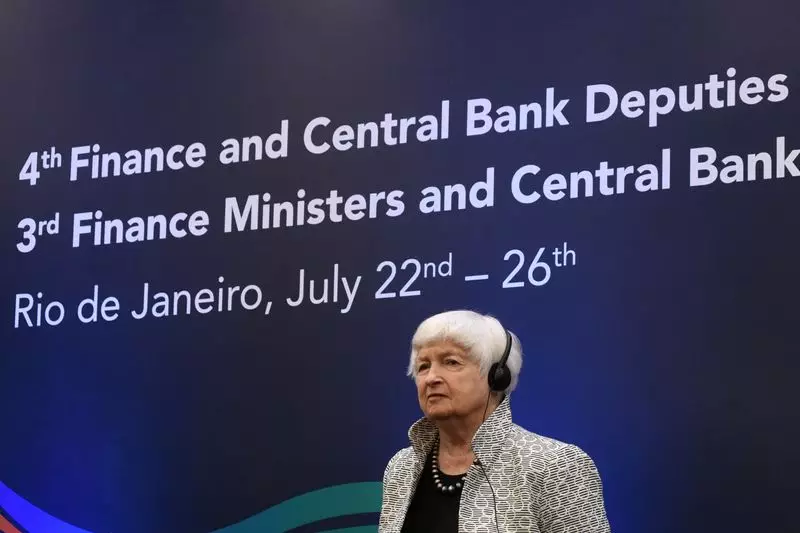As the political landscape in Washington continues to evolve, U.S. Treasury Secretary Janet Yellen has hinted at her potential exit from government roles following the conclusion of President Joe Biden’s term in January. At the recent Texas Tribune Festival, when asked about her future in office, she stated, “Probably done, but … we’ll see.” Her words illustrate a sense of ambivalence that many high-ranking officials feel as they approach the end of their service; the uncertainty surrounding future leadership and policy direction can make it difficult to definitively outline their next steps. Yellen, at 78, has made history as the first woman to lead both the Treasury Department and the Federal Reserve, a legacy that speaks volumes about her tenure and contributions to American economic policy.
Yellen’s tentative remarks come as the political arena heats up with prospective candidates, including Vice President Kamala Harris and former President Donald Trump, preparing for the upcoming election. As she contemplates her departure, her focus remains on pressing economic matters at the Treasury, which reveals a commitment to seeing through ongoing initiatives, particularly in managing complex international relations.
One of the significant aspects of Yellen’s current role involves maintaining a working relationship with China, a country with which the U.S. has an intricate, often contentious relationship. In her statements from the Austin event, Yellen indicated that she expects to consult with her Chinese counterpart, He Lifeng, in the near future to address economic challenges and diplomatic tensions. The urgency of these discussions cannot be overstated; recent meetings have centered on domestic policies in China that have global implications, such as industrial overcapacity. Yellen’s previous warnings about this issue, aimed at encouraging more sustainable practices, were a clear indication of her proactive approach to international economics.
Moreover, she indicated that the U.S. is sending a delegation led by Undersecretary Jay Shambaugh to Beijing for further discussions. This highlights a critical element of Yellen’s strategy: maintaining a dialogue to prevent escalating tensions. In her own words, the U.S.-China relationship “needs to be prioritized and nurtured,” underscoring a philosophy that highlights the importance of communication in diplomacy. In the high-stakes context of international economics, fostering a stable relationship with China is essential, not only for both nations but also for global economic stability.
Yellen has also provided insights into the state of the U.S. economy, citing a “solid economy” and the successful navigation towards a “soft landing” regarding inflation rates. She emphasized a positive trend in consumer spending and reassured that a slowdown in job creation does not equate to a bleak economic future. Yellen made it clear that stabilizing employment levels remains a top priority, even while remaining vigilant to possible downturns.
Her analysis reflects a nuanced understanding of economic indicators and their interplay, indicating that while the current environment may lack the previous frenzy of hiring, it does not necessarily predict a looming recession. Instead, Yellen’s outlook reveals a cautious but optimistic perspective, marked by the need for vigilance in employment trends.
As Janet Yellen nears the conclusion of her service, her legacy will undoubtedly intertwine with the pivotal economic conversations she has led and the policies she has influenced. She has underscored the necessity of maintaining critical international relationships, particularly with China, while simultaneously navigating domestic economic challenges.
While Yellen’s imminent departure from government leaves a gap in leadership, her approach to economic policy and diplomacy provides a roadmap for her successors. Feeding these discussions and prioritizing consistency in U.S.-China relations will remain essential tasks for whoever takes up the mantle in the coming administration. Yellen’s tenure has not only been marked by historical milestones but also by a keen awareness of the complex interplay between local and global economic landscapes, a balance that will continue to shape U.S. policy long after her exit from the Treasury.

